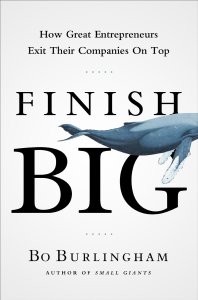 Every entrepreneur exits. It’s one of the few absolute certainties in business. Assuming you’ve built a viable company, you can choose when and how you exit, but you can’t choose whether. It’s going to happen. You can count on it.
Every entrepreneur exits. It’s one of the few absolute certainties in business. Assuming you’ve built a viable company, you can choose when and how you exit, but you can’t choose whether. It’s going to happen. You can count on it.
That this simple fact of business life comes as a shock to many owners of private companies is in itself a testament to how little attention the final phase of the journey receives compared to other aspects of business. Do an online search for business marketing, finance, customer service, managing, or culture, and you’ll find oceans of information.
What’s available on exits is a mere trickle by comparison, and almost all of it has to do with maximizing the amount of money you can get from a sale of your business. But there are many other aspects to the process and they play a larger role than the size of the deal in determining whether the exit has a happy ending—that is, whether you “finish big.”
But how? Where do you even begin? For that matter, when should you begin?
- What are your options?
- How much money should you be looking for?
- What role models are there, if any?
- What pitfalls should you be aware of?
- How do you identify and qualify potential successors if that’s the route you choose to take?
- Alternatively, how do you find potential acquirers?
- What sort of outside help do you need?
- How much should you tell other people in the company?
- What will you do after you leave?
Once I took a closer look at exiting, I realized that it is a far more complex subject than I’d realized. It isn’t an event. It is a phase of business, just as the start‑up period is a phase. As in a start‑up, there are many factors that affect how successful the exit will be. For that matter, there are different ways to define what a successful business succession plan looks like.
While it soon became clear that no two exit experiences were exactly alike, it was equally obvious that some were a lot better than others.
By that, I mean that some people wound up happy with the process and satisfied with the way it turned out, while others looked back on it as a nightmare and came away with deep regrets about the outcome.
My question was, why? What did the people with “good exits” do differently from those who’d had “bad exits”?
The Qualities of a "Good Exit"
I had to begin by clarifying in my own mind what a good exit consisted of. For most people, I’d found, there were four elements:
1. Owners felt that they’d been treated fairly during the exit process and appropriately compensated for the work they’d put in and the risks they’d taken to build their businesses.
2. They had a sense of accomplishment. They could look back and know that through their businesses they’d contributed something of value to the world and had fun doing it.
3. They were at peace with what had happened to other people who’d helped build their businesses—how those people had been treated, how they’d been rewarded, and what they’d taken away from the experience.
4. They had discovered a new sense of purpose outside of their businesses. They had new lives that they were fully engaged in and excited about.
For some people, there was a fifth element:
5. The companies they’d created were going on without them and doing better than ever, and they could take pride in the way they’d handled one of the most difficult tasks faced by any CEO: a business succession plan
.
So how had the owners who’d had good exits gone about preparing for the day they would leave? What were the patterns?
In listening to the entrepreneurs I interviewed, I was constantly reminded of an old saying: You should build a business today as if you will own it forever but could sell it tomorrow. Most of the great entrepreneurs I’ve been privileged to know have followed that dictum.
My friend and sometime coauthor Jack Stack of SRC Holdings (which was sold to its employees) makes the comparison to keeping up the market value of your home—fixing the roof, adding rooms, painting regularly—even if you have no intention of moving anytime soon.
The same logic applies to businesses. Oddly enough, you’re far more likely to have a company that’s built to last if you simultaneously build it to sell. You’re also far more likely to have a happy exit.
Excerpted from Bo Burlingham’s new book, Finish Big: How Great Entrepreneurs Exit Their Companies on Top.
Other Articles You Might Like:
- Changing the Way We Change: Zingerman's Approach to Organizational Change
- Top 5 Reasons to Attend the Gathering of Games Conference
.png)








.png)




-5.png)
.png)
